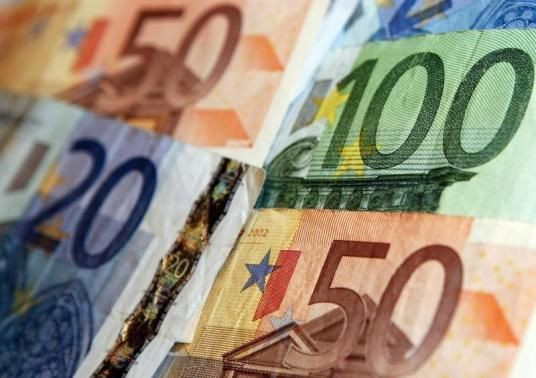European Inflation Turns Negative, As Euro Plunges, Bond Yields Tumble And Oil Prices Plunge

(Reuters) - The euro hit a nine-year trough and bond yields in several euro zone countries reached record lows on Wednesday, as tumbling oil prices tipped inflation into negative territory for the first time since 2009, raising the prospect of outright deflation.
Euro zone annual inflation in December was -0.2 percent, lower than expected and far below the European Central Bank's medium-term target of just under 2 percent.
The fall was driven by tumbling energy prices. Brent crude oil futures fell below $50 a barrel on Wednesday for the first time in almost six years, marking a startling decline of around 40 percent in just two months.
"Today's figures pile yet more pressure onto the ECB to deliver a sizeable quantitative easing program at its policy meeting later this month. But it's too late to head off deflation now," said Jonathan Loynes, chief economist at Capital Economics.
"Without a rebound in oil prices, energy effects alone could push the headline inflation rate down towards -1 percent in the early months of this year and keep it in negative territory for most of 2015."
The ECB meets on Jan. 22 but may be reluctant to act aggressively before Greece's general election on Jan. 25, a vote which could raise the prospect of an exit from the euro zone if the left-wing Syriza party wins.
The euro fell as low as $1.1819 in anticipation of more money-printing by the ECB, down a half of one percent on the day.
The dollar fared better, bouncing to 119.10 yen from a low of 118.04 touched on Tuesday and was up a half of a percent against the Swiss franc at 1.0150 francs.
OIL KEEPS FALLING
Euro zone inflation expectations, measured by the ECB's preferred gauge of 5-year forwards, fell to a fresh low of 1.58 percent and government bond yields around the world fell as investors wrestled with the risk of global deflation.
Longer-term borrowing costs in Japan, Germany, France, The Netherlands, Austria, Belgium, Finland, Canada and Australia bonds all reached record lows.
Yields on German bonds of maturities of up to 5 years were negative and the 10-year yield touched as low as 0.44 percent.
The average 10-year sovereign bond yield across the G3 -- United States, euro zone andJapan -- is below 1 percent for the first time ever, even lower than during the 1930s Depression, according to Citi.
The decline in oil showed no sign of letting up. Brent fell more than 2 percent earlier in the day to dip below $50 a barrel for the first time since early 2009 before rebounding back above $51.
In equity markets the FTSEurofirst 300 index of leading European shares was up 1 percent, and the major U.S. stock index futures pointed to a higher open of more than 0.5 percent on Wall Street.
That would break a run of five straight losing sessions, the longest losing streak since late 2013 for the S&P 500.
Minutes of the U.S. Federal Reserve's last policy meeting are due later Wednesday and should expand on where members felt rates were heading.
Investors pushed back their expectations for the day when the Fed might be able to hike interest rates. Fed fund futures imply no chance of a hike by June and only one rise to 0.5 percent by year end.
Even if the Fed sticks to its current timetable and moves around mid-year, markets are wagering it will be so far ahead of the curve that inflation will remain permanently low.
Yields on benchmark U.S. 10-year Treasury bonds were steady at 1.96 percent and 30-year yields were up a basis point at 2.52 percent, inching up from the all-time trough of 2.443 percent hit on Tuesday.
© Copyright Thomson Reuters 2024. All rights reserved.





















